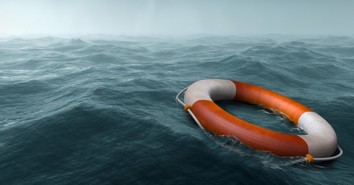Embracing the Peace That Truly Empowers Us
A threat is rising to the US and global commerce from a group you’ve probably heard little about two missiles fired from territory held by Houthi rebels in Yemen missed a commercial tanker loaded with jet fuel today. An American warship also shot down a suspected Houthi drone that was flying in its direction. This after a missile fired by Houthis struck a Norwegian-flagged tanker in the Red Sea yesterday.
Such attacks have been targeting commercial vessels for several days. US Navy ships have shot down an array of drones headed their way believed to have been launched by the militant group. Last month, the jihadists seized a transport in the Red Sea linked to Israel and are still holding the vessel.
So, who are the Houthis? How much of a threat are they to Israel and the US? The answers are troubling for the region and are contributing to the growing prospect of global war.
A Worst-Case Scenario for the US
Yemen, the Arab world’s poorest nation, is a country of twenty-eight million people on the southern end of the Arabian peninsula. In the 1990s, the Houthi movement emerged in the northern part of the country in reaction to rising Saudi financial and religious influence. Their name comes from the surname of the movement’s early leader, Hussein al-Houthi, who died in 2004.
The Shiite group, backed by Iran, has been fighting Yemen’s Sunni-majority government for two decades. They control the capital city of Sanaa and much of the western part of the country. They have been protesting the IDF’s post-October 7th incursion into Gaza by targeting ships headed toward Israel as well as US forces in the area.
It is not difficult to imagine a scenario in which Houthis in the south combine with Hezbollah in the north, Palestinian Islamic Jihad in the West Bank, and Hamas in Gaza to form a four-front assault against Israel. All four are proxies of Iran, which has long sought Israel’s destruction. They could not realistically defeat the IDF, but their incessant attacks could discourage Israelis and prompt them to abandon their nation.
In such a scenario, the US would likely need to escalate its military support for Israel. This is at a time when Ukraine is seeking additional support for its ongoing war with Russia. If China were to invade Taiwan, the US would find itself on the other side of yet a third global conflict.
According to A. Wess Mitchell, senior advisor for the United States Institute of Peace and a former assistant secretary of state for Europe and Eurasia, this is the worst-case scenario for the US. He writes in Foreign Policy that our military is not designed to fight wars against two major rivals simultaneously, much less three. We would fight such a world war as “a thinly stretched US military alongside ill-equipped allies that are mostly unable to defend themselves against large industrial powers with the resolve, resources, and ruthlessness to sustain a long conflict.”
Mitchell believes that waging such a global war “would require a scale of national unity, resource mobilization, and willingness to sacrifice that Americans and their allies have not seen in generations.”
“A Situation Without Obvious Historical Parallel”
Is Mitchell correct in his assessment? A recent poll asked Americans about values they consider “very important,” contrasting responses made in 1998 with today. The results:
- Patriotism: 70 percent vs. 38 percent today
- Religion: 62 percent vs. 39 percent today
- Having children: 59 percent vs. 30 percent today
What explains this radical shift?
Carl Trueman writes in his book The Rise and Triumph of the Modern Self, “The modern self is one where authenticity is achieved by acting outwardly in accordance with one’s inward feelings.” Such a worldview privileges the individual over commitments to patriotism, religion, children, or community. Trueman calls this “a situation without obvious historical parallel.”
These reflections give us even greater reason for concern regarding our nation and her future. The internal “crisis of despair” we are facing, alongside potentially the greatest external threats we have seen in decades, combine to make this Advent week of peace even more relevant for our society and for our souls.
“Not as the world gives do I give to you.”
Paradoxically, the peace we need is found not in seeking it but in resolving the foundational issue that robs it from us. Yesterday, I shared Dietrich Bonhoeffer’s most famous quote from his classic, The Cost of Discipleship. Here is his statement in its context:
The cross is laid on every Christian. The first Christ-suffering that every man must experience is the call to abandon the attachments of this world. It is the death of the old man who is the result of his encounter with Christ. As we embark upon discipleship, we surrender ourselves to Christ in union with his death—we give over our lives to death. Thus, it begins; the cross is not the terrible end to an otherwise God-fearing and happy life, but it meets us at the beginning of our communion with Christ. When Christ calls a man, he bids him come and die.
We were created to love God and each other unconditionally and sacrificially (Matthew 22:37–39). Consequently, self-centered people acting “in accordance with one’s inward feelings” are at war with God, others, and themselves.
However, when we surrender our lives, ambitions, and challenges to the Prince of Peace, his omniscience guides us, his omnipotence empowers us, and his omnibenevolence encourages us. We can claim Jesus’ promise, “Peace I leave with you; my peace I give to you. Not as the world gives do I give to you” (John 14:27a). And we can answer his invitation, “Let not your hearts be troubled, neither let them be afraid” (v. 27b).
Is your heart “troubled” or “afraid” today?
NOTE: The end of the year is a vital time of giving for ministry nonprofits like Denison Forum, so please consider your best year-end gift today. Also, you can 2X your impact when you give today due to a generous donor who’s already provided a $150,000 matching grant. Please donate today to support the continued work of Denison Forum to change the culture with Christ-transforming truth.
Photo Courtesy: ©Unsplash/thenata
Publish Date: December 13, 2023
Jim Denison, PhD, is a cultural theologian and the founder and CEO of Denison Ministries. Denison Ministries includes DenisonForum.org, First15.org, ChristianParenting.org, and FoundationsWithJanet.org. Jim speaks biblically into significant cultural issues at Denison Forum. He is the chief author of The Daily Article and has written more than 30 books, including The Coming Tsunami, the Biblical Insight to Tough Questions series, and The Fifth Great Awakening.
The views expressed in this commentary do not necessarily reflect those of CrosswalkHeadlines.
For more from the Denison Forum, please visit www.denisonforum.org.
The Daily Article Podcast is Here!







